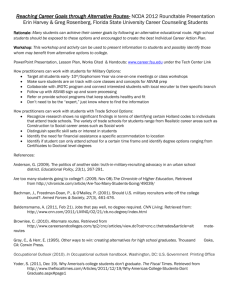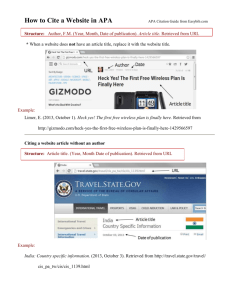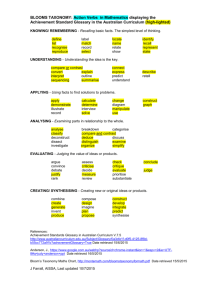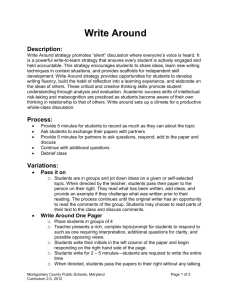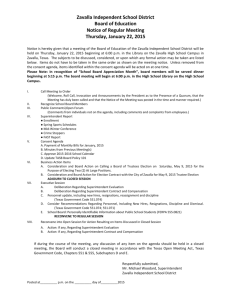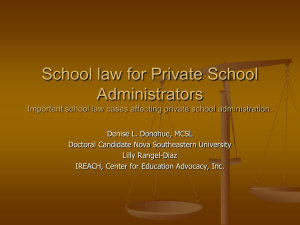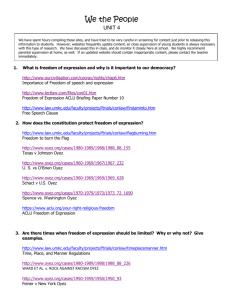Ethical Dilemma: Superintendent Harassment in Schools
advertisement
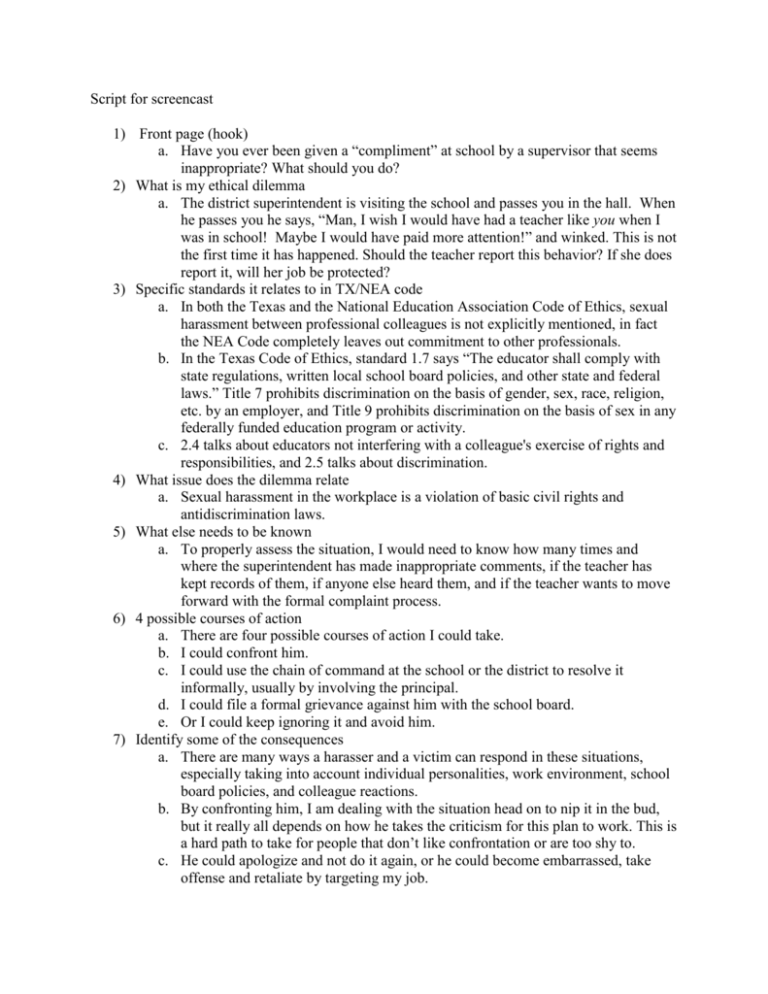
Script for screencast 1) Front page (hook) a. Have you ever been given a “compliment” at school by a supervisor that seems inappropriate? What should you do? 2) What is my ethical dilemma a. The district superintendent is visiting the school and passes you in the hall. When he passes you he says, “Man, I wish I would have had a teacher like you when I was in school! Maybe I would have paid more attention!” and winked. This is not the first time it has happened. Should the teacher report this behavior? If she does report it, will her job be protected? 3) Specific standards it relates to in TX/NEA code a. In both the Texas and the National Education Association Code of Ethics, sexual harassment between professional colleagues is not explicitly mentioned, in fact the NEA Code completely leaves out commitment to other professionals. b. In the Texas Code of Ethics, standard 1.7 says “The educator shall comply with state regulations, written local school board policies, and other state and federal laws.” Title 7 prohibits discrimination on the basis of gender, sex, race, religion, etc. by an employer, and Title 9 prohibits discrimination on the basis of sex in any federally funded education program or activity. c. 2.4 talks about educators not interfering with a colleague's exercise of rights and responsibilities, and 2.5 talks about discrimination. 4) What issue does the dilemma relate a. Sexual harassment in the workplace is a violation of basic civil rights and antidiscrimination laws. 5) What else needs to be known a. To properly assess the situation, I would need to know how many times and where the superintendent has made inappropriate comments, if the teacher has kept records of them, if anyone else heard them, and if the teacher wants to move forward with the formal complaint process. 6) 4 possible courses of action a. There are four possible courses of action I could take. b. I could confront him. c. I could use the chain of command at the school or the district to resolve it informally, usually by involving the principal. d. I could file a formal grievance against him with the school board. e. Or I could keep ignoring it and avoid him. 7) Identify some of the consequences a. There are many ways a harasser and a victim can respond in these situations, especially taking into account individual personalities, work environment, school board policies, and colleague reactions. b. By confronting him, I am dealing with the situation head on to nip it in the bud, but it really all depends on how he takes the criticism for this plan to work. This is a hard path to take for people that don’t like confrontation or are too shy to. c. He could apologize and not do it again, or he could become embarrassed, take offense and retaliate by targeting my job. 8) Supreme Court rulings a. The teacher cannot file a lawsuit if there is no actionable discrimination or retaliation against her. She can try and hold the district accountable in court if she is fired, but she cannot sue the superintendent just because he made some inappropriate remarks towards her, there are steps she must take. b. I could not find any case law about employee-to-employee harassment culminating in termination under Title 9, but these three cases relate to the dilemma by setting precedence for harassment and retaliation in the workplace. 9) What I would do? a. I would directly, yet tactfully and calmly, confront the superintendent and make it clear that his comments are unprofessional, unwelcome and will not be tolerated. 10) Commitment statement a. I wrote my commitment statement to include ethical behavior on my part no matter what my colleagues do. 11) What could go wrong a. A negative consequence of my confrontation could be that my plan backfires and blows up in my face. He could say that he was just kidding and that I need to lighten up, or he could tell my principal that I need to be watched closely because I like to make false accusations. b. He could completely blow me off and keep making the remarks, or worst case would be that I eventually get fired. 12) My plan if something goes wrong a. If something went wrong, I would try and correct the situation by being respectful and staying calm, always bringing a colleague along to witness my interactions with him, keeping thorough records and bringing the principal into it. b. If I had to I would hire a lawyer to litigate my wrongful termination. 13) To conclude a. In a nutshell, the teacher needs to deal with the superintendent right away, face to face. If he does not stop, she needs to move forward with a formal grievance process. Her job would be protected under the Equal Employment Opportunity Commission and Texas’ fair employment laws since retaliation is unlawful. References Burlington Industries, Inc. v. Ellerth. (n.d.). Oyez. Retrieved October 12, 2015, from https://www.oyez.org/cases/1997/97-569 Faragher v. City of Boca Raton. (n.d.). Oyez. Retrieved October 12, 2015, from https://www.oyez.org/cases/1997/97-282 FindLaw (2008). Discrimination by Supervisors: Is It Actionable? Retrieved from http://corporate.findlaw.com/litigation-disputes/discrimination-by-supervisors-is-itactionable.html National Education Association (2009). Code of ethics. Retrieved from http://www.nea.org/home/30442.htm Texas Administrative Code. (2010). Code of Ethics and Standard Practices for Texas Educators. Retrieved from http://texreg.sos.state.tx.us/public/readtac$ext.TacPage?sl=R&app=9&p_dir=&p_rloc=&p_tloc= &p_ploc=&pg=1&p_tac=&ti=19&pt=7&ch=247&rl=2 Texas Administrative Code. (2011). Purpose and Scope; Definitions. Retrieved from http://texreg.sos.state.tx.us/public/readtac$ext.TacPage?sl=R&app=9&p_dir=&p_rloc=&p_tloc= &p_ploc=&pg=1&p_tac=&ti=19&pt=7&ch=247&rl=1 U.S. Department of Justice Civil Rights Division (2001). Title IX Legal Manual. Retrieved from http://www.justice.gov/sites/default/files/crt/legacy/2010/12/14/ixlegal.pdf U.S. Equal Emloyment Opportunity Commission (2010). Selected Supreme Court Decisions. Retrieved from http://www.eeoc.gov/eeoc/history/35th/thelaw/supreme_court.html U.S. Equal Emloyment Opportunity Commission (2010). Title VII of the Civil Rights Act of 1964. Retrieved from http://www.eeoc.gov/laws/statutes/titlevii.cfm

